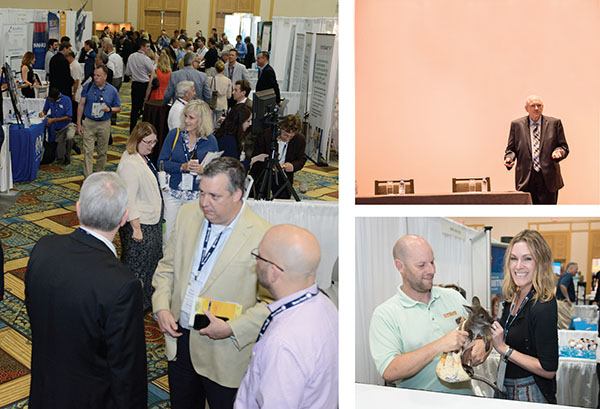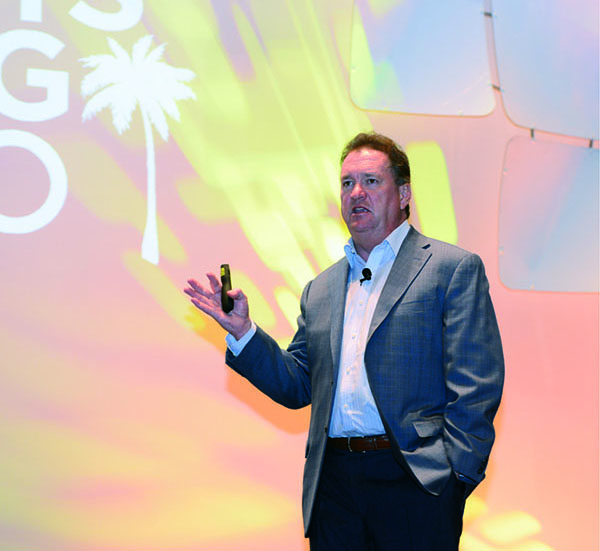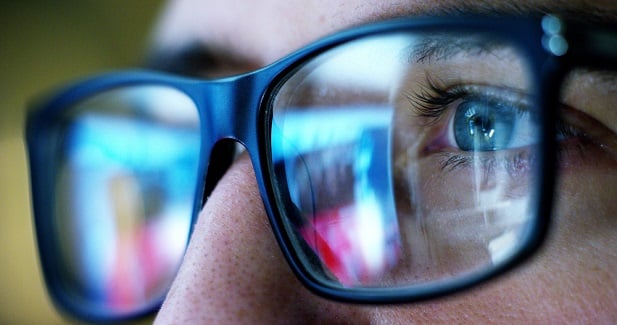

The newly renamed 2016 BenefitsPRO Broker Expo (formerly Benefits Selling Expo) drew nearly 1,000 attendees and 120 exhibitors to sunny Hollywood, Florida. Three days packed with networking, breakout sessions, dialogue, and debate were highlighted by presentations from top-notch keynote speakers, including health care futurist Jim Carroll, former White House Press Secretary Ari Fleischer, and former U.S. Senator Christopher Dodd. If you couldn't join us (or just want to revisit these great talks) here's a recap of our 12th annual show.
Health care: The future is now
By Shawn Moynihan
When listening to futurist Jim Carroll speak, one thing quickly becomes apparent: The future belongs to those who are fast.
Delivering the keynote at the BenefitsPRO Broker Expo, Carroll provided a rapid-fire, deeply insightful “fast future” presentation on where the future of health care and benefits is headed. And to hear him tell it, it is bright for those who would embrace the impact of mobile technology and how the Internet of Things (IoT) will reshape the entire process of health care sooner than later.
For starters, Carroll explained, 10 years from now, health care will look nothing like it does today. A fundamental transformation, he explained, is on its way, and in many cases, already happening. Genetic testing and DNA sequencing will forever alter the manner in which illness is forecasted, diagnosed, and treated, in advance of the condition arising rather than after the fact, the way medical professionals do now.

Years ago, he said, having a handheld device that monitors vital signs, takes your blood pressure, and reads your EKG was the stuff of science fiction. Today, it is a reality, courtesy of the Scanadu Scout (a tool now being tested by more than 7,000 people in more than 70 countries), and that tech will only become less expensive as time goes on. It's not farfetched, Carroll added, to imagine a day when you can walk into Best Buy and purchase an inexpensive device that does all these things and more, including diagnosing future ailments.
With the advent of technologies that monitor health signs via wearable devices and mobile devices connected to the Internet, those patients requiring critical care will also change the way hospitals operate — which is advantageous, considering the number of baby boomers who will comprise so much of the U.S. population in the coming decades.
What does all this mean? Massive opportunity for those who think forward and recognize how the IoT will shape the world of pharmaceuticals and benefits. The World Economic Forum posits that the global economic impact of the five leading chronic disease — cancer, diabetes, mental illness, heart disease, and respiratory disease — could reach $47 trillion over the next 20 years.
What if technology could allow medical science to get out in front of that, so that those costs could be slashed?
Such revolutionary developments in health care virtualization will be driven by big goals and big thinking, said Carroll. Onscreen, he showed the frightening statistics on obesity levels in the U.S. over the past few decades over a map of all 50 states, staggering numbers that illustrate one of the great health challenges of the modern age. However, that's not even the biggest worry looking forward.

“Alzheimer's disease and dementia will be the great challenge of our time,” said Carroll, noting that his mother-in-law had suffered and died from the condition, the sixth-leading cause of death in the U.S. Going forward, however, developments in science will allow for earlier detection and better treatment options.
Luckily, medical knowledge is doubling every eight years, Carroll said. Previously unthinkable advancements such as the 3-D printing of personalized knee replacements are happening now; the growth of replacement organs is something that will be available to medical professionals within years, not decades. Ingestible technology will show us how we're responding to medications, offering diagnostics on how our bodies are reacting to treatment.
The greatest challenges faced by health care CEOs, Carroll said, include the need to focus on a direct relationship with the customer — which will require wholesale re-engineering of member plans — and rapid deployment of mobile products to meet customer expectations. People will become far more engaged with matters of their own health, as they are empowered with technology that's connected to their mobile device.

Carroll acknowledged what he called the “organizational sclerosis” that hampers big ideas and innovative thinking, but offered this piece of advice for those whose ideas may alter the health care landscape: “Think big, start small, and scale fast.”
Frank talk from Dodd
By Warren S. Hersch
When the polls close on Election Day in November, Hillary Clinton will emerge as the winner of the campaign for the presidency. Her victory will likely secure for the Democrats new seats in the House and Senate. And those gains will prompt renewed bipartisan cooperation on pressing national issues, not least the provisions of the Affordable Care Act that need fixing.
Former U.S. Senator Christopher Dodd made these predictions during his keynote address at the BenefitsPRO Broker Expo. Now chairman and CEO of the Motion Picture Association of America, Dodd offered a wide-ranging critique of current events and the fractured political landscape.
Amid the rancor of the current election season and Americans' pessimism about the future, Dodd said he remains “hopeful” that come 2017, the nation's political leaders will put aside differences to address legislation needed to reform the immigration system, taxation, Social Security, Medicare, and other top national concerns.
“Historically, the country has had its share of rough times,” said Dodd. “But we've managed to emerge stronger from past crises. I remain optimistic that we can overcome domestic and international policy issues—if we all come together.”

That may seem a tall order at present. Voter anger and outrage about the state of the nation, he noted, has been growing in recent years. Despite economic achievements touted by the Obama administration, Americans have suffered since the 2007-2009 recession. Many pin the blame for their woes on the financial excesses of Wall Street, a lowering of trade barriers that have ravaged industries, market pressures that have depressed wages, and the high cost of maintaining America's military footprint overseas.
These factors, combined with growing disillusionment with continuing gridlock in Washington, help to explain higher voter support for Bernie Sanders and Donald Trump—insurgent candidates whose policy positions fall outside the mainstream of their respective parties.
A Clinton victory in November would yield three consecutive terms for the Democrats in the White House—a first for the party since the Roosevelt-Truman era. Dodd pinned his prediction in part on continuing economic growth and President Obama's overall approval rating, which (based on a recent Gallup poll) stood at 51 percent as he spoke.
“Over the last nine presidential election cycles, this has been the most accurate predictor of a future president,” said Dodd. “In every case where a majority of Americans approved of the president's performance, the incumbent's party has won.”
Enhancing the Democratic Party's chances of securing the White House are the divisions within the Republican Party. The likelihood of an “acrimonious” GOP convention in Cleveland come July — notably a schism between Trump supporters and opponents — could irreparably damage the party's efforts to unite behind the nominee for the general election. By contrast, Sanders' supporters will back Clinton if, as Dodd expects, Clinton secures the nomination at the party's national convention in Philadelphia in July.

A White House win, he added, would likely secure other seats in play for the Democrats in 2016. Chief among them: The Senate, where 24 Republicans are up for re-election this year, as compared to 10 seats for the Democrats. Given the current balance of power — the Senate has 54 Republicans, 44 Democrats, and two independents that consistently vote with the Democratic caucus — a net gain by the Dems of five seats in November would earn for them a majority.
Turning to the Affordable Care Act, Dodd acknowledged “serious issues” that it failed to adequately address, including rising health care costs, insurance premiums, and a lack of coverage for millions of Americans who didn't benefit from the reform law. He insisted that the right approach is to fix specific issues with the legislation, rather than (as the Republicans have repeatedly tried) to repeal and replace the law. Again, assuming Democratic gains in November, bipartisan cooperation on an overhaul of the law will likely ensue, said Dodd.
“My hope is the next president will have the good sense and judgment to confront issues in the law and move forward, rather than engage in an endless political brawl,” he said. “I have faith in the political process.” Ari Fleischer: Witness to history, again
By Shawn Moynihan
While delivering his keynote speech at the BenefitsPRO Broker Expo, former White House Press Secretary Lawrence Ari Fleischer couldn't resist opening with a jab against journalists.
“After spending my mornings, afternoons, and far too many of my nights in the company of the White House Press Corps, I can say that it's a pleasure to be here with you,” said Fleischer, to amused reaction from those in attendance.
Raised as a liberal Democrat, Fleischer recalled how President Ronald Reagan's “peace through strength and unyielding sense of patriotism” moved Fleischer to embrace a conservative point of view, and how proud he was to accept the position as press secretary for President George W. Bush following the hotly contested 2000 election. He recounted how his office was located 30 feet from the podium in the White House briefing room, where he would address the press corps. Fleischer described each briefing as a “live quiz show with no net under the podium,” and said he thrived on the pressure. “That was the excitement of the job, and eventually, that leads to the burnout of the job,” he admitted. “It was the honor of a lifetime.”

Fleischer explained how there has to be a simpatico relationship between the press secretary and the president, as there's not always time to ask what should and should not be said during briefings. “You just have to know,” he said.
During his time serving under President Bush, Fleischer met Pope John Paul II twice and Shaquille O'Neal only once; flying aboard Air Force One, he said, was an experience beyond compare, and he misses the days when “not once while waiting to take off from New York would you hear that you were [listed as] No. 17 for takeoff.”
The 9-11 attacks that devastated America in 2001 were his most poignant moments during the Bush administration, and Fleischer recalled how he stood 15 feet away as Bush was informed during a visit with schoolchildren that the second tower had been hit by a commercial airliner and that America was under attack. During the president's subsequent trip to Manhattan to visit Ground Zero (then still a smoking pile several stories high of twisted, molten metal and debris), he watched as Bush spoke with the families of those still missing in the remains of the once-great skyscrapers, desperate for answers, but still clinging to hope that they would be found.
Fleischer next weighed in on the presidential race and spoke at length about the various wild cards in play, still months away from the Democratic and Republican conventions. “This race is nuts,” he said, shaking his head in bemusement.
“Trump has shown that much of the Republican base is more of a populist, blue-collar group of voters,” said Fleischer. “The Republican base is fed up, and has heard it all before.” It is sick of business-as-usual politicians, he added, upon whom the populace feels they cannot rely to get anything done in Washington. “Trump makes himself sound like someone who 'gets it,' and will fight for them. He has done a superb job of revving them up and giving them hope.”
However, Fleischer noted votes are earned by building bridges with politicians on the other side of the fence and bringing in coalition partners, something Fleischer said he believes very much in. Finding that common ground and working well with others is essential, he added, in proving oneself worthy of the presidency.
Additionally, Fleischer noted the importance of the minority vote, and that the general election is becoming less and less white. The Hispanic vote in particular, he said, is critical, and garnering 30 percent of the minority vote is key to a presidential victory.
Fleischer cited a “tremendous amount of distrust” of Clinton, who is being challenged in some areas of the country by “socialist Bernie Sanders.”
“He's actually giving her a run for her money.”
Still, Fleischer believes that Hillary will win the Democratic nomination due to her popularity with minority communities that represent so much of the Democratic vote—and that in order for either Trump to emerge victorious, they would have to capitalize heavily on high-impact attacks against her as an establishment candidate who offers more of the same of what the public has seen out of Washington in recent years.
Fleischer added that he believes President Obama “created the environment for Trump to come along,” explaining that Obama has not worked effectively across the aisle with a Republican-held Congress—something that he said both Bill Clinton and George W. Bush were able to achieve. Fleischer said Obama's “high-minded, moralistic point of view” has kept him from achieving such bipartisan compromises.
In any case, no matter who wins, one thing is certain: It's going to be a wild ride for the remainder of the election process.
“What a year,” said Fleischer. “And we haven't even hit the conventions yet.”
© 2025 ALM Global, LLC, All Rights Reserved. Request academic re-use from www.copyright.com. All other uses, submit a request to [email protected]. For more information visit Asset & Logo Licensing.







